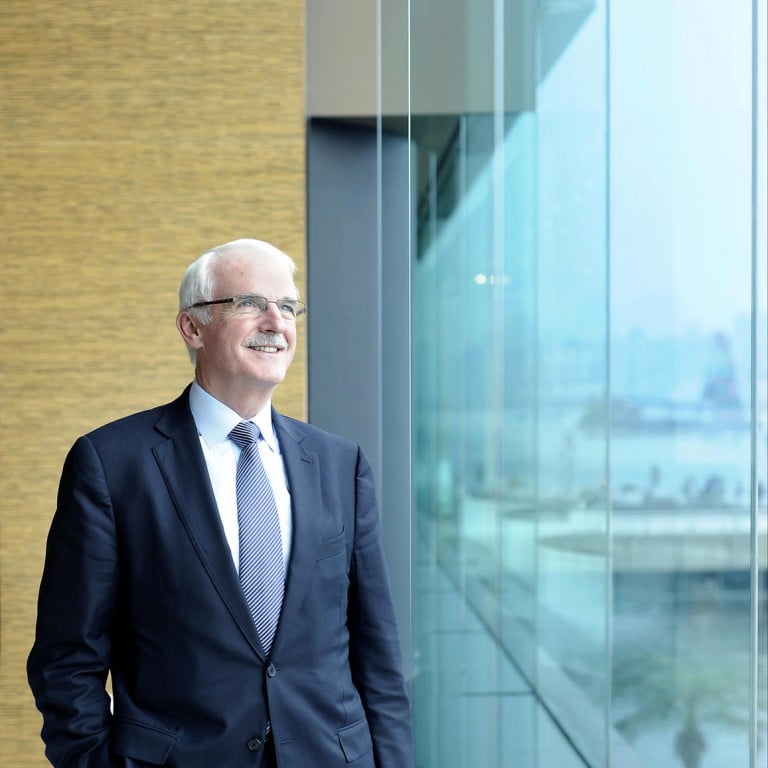
Owner of world landmark Burj Al Arab hotel in Dubai eyes expansion in Asia
Heated competition and China's slowing economic growth fail to dampen Jumeirah chief's ambition to build the group's presence in Asia amid the robust demand for travel
Outside the Middle East, Jumeirah is a brand lesser-known than its flagship Burj Al Arab Jumeirah hotel in Dubai, which is recognised as one of the world's landmark buildings.
However, Jumeirah Group's chief executive Gerald Lawless is determined to build the relatively young brand name in Asia despite heated competition. He is also bringing the group's new hotel brand, Venu, to Hong Kong, Singapore, Tokyo, Seoul and Taipei.
Lawless, an Irish national, joined Jumeirah in 1997 after a 23-year career with Forte Hotels, helping set up the British hotel company's operations in the Middle East.
He is the vice-chairman of corporate governance for the World Travel & Tourism Council and a member of the World Economic Forum's global agenda council for aviation, travel and tourism.
No, we won't be interested in purchasing an asset. We intend to stay asset-light, particularly outside our home base in Dubai. But we would like to have a hotel in Hong Kong. We think Hong Kong and other prime Asian cities like Singapore and Tokyo are important cities for Jumeirah to be represented in.
It will depend on the location. We want to stay asset-light. But that doesn't mean that, in certain locations, we wouldn't participate perhaps in equity if it was the right project.
We do have organisations that we have close relationships with who will possibly be prepared to come with us as an investor, particularly if you look at investors out of the Middle East who like the Jumeirah brand.
I would like to look at Beijing because I think the capital is very important. Dalian and Tianjin are also the cities to be in, as well as Chengdu.
We have launched our second brand, Venu, which is a more youthful and modern brand, which I think will do very well in various places in China.
We are still optimistic that [China's] domestic market will continue to grow. As more and more people can afford to travel and become economically more active in terms of being in business, [there will be a growing] need to travel not just for leisure but also for business.
I believe there is a major opportunity for China to encourage international tourism into the country. I think most people in the world want to visit China. It's a must-see country, and China itself is a country that has so much to offer to tourists.
For us hoteliers, we need more international visitors and growth in the domestic market.
We must respect the law of the land we operate in and the regulations that might apply from time to time. Ultimately, I think the situation will balance itself out. And there has got to be practicality and an understanding that our industry is creating jobs.
I agree that there is nothing worse than corruption and corruption destroys society and ultimately business. I can understand the government bringing out a blanket ban initially, but ultimately it will refine that ban to make sense within the industry.
Absolutely. There are also a lot of funds from the Middle East buying assets [abroad]. We always make sure that we exist as well. If they buy assets, they can consider us to be the [hotel] operator. By all means, if it's a Chinese company doing that, we'd be very happy to partner with them.
But very often, you have the situation that, for example, if the Waldorf Astoria Hotel is sold by Blackstone Group, which owns Hilton, they will put in as a condition of the sale that they continue the management agreement.
The hotel business is long-term. When you build a hotel, you are looking at a 20 to 50-year window. You can't just do that for the short term. First of all, planning and preparation will take four to five years just to get a major hotel up and open.
Yes, you will have the peaks and downturns. But if you look at total travellers of more than 1.1 billion a year, and it's growing at 4.7 per cent per annum [faster than the growth in the global economy], it shows you that travel is still one of the greatest activities for human beings and everybody would love to travel as soon as they can afford it. And hopefully, people's wealth will grow.
We need to get more than 3 per cent [gross domestic product] growth for the world economy. But our business of tourism and travel is growing faster than the world economy.
I think that will continue to stimulate demand for hotels. So the hotel business in Tokyo should be able to give a reasonable return over time.
Our main strategy at the moment is to develop in Asia, the Middle East and Africa, and also opportunistically in Europe. But actually, the European opportunities are coming very quickly these days. We have signed management agreements for St Petersburg. We are already in Istanbul, Rome, Frankfurt, London and Mallorca, Spain. So we are quite active there already.
We are now very active in looking for more hotels in Dubai, which will have the World Expo 2020. We are looking at doubling the hotel and serviced apartment rooms in Dubai by that date.
We would like to get into Africa. We think Venu would be particularly interesting for Africa. We have lots of discussions going on at the moment with various parties. Recently, I have been to Abuja in Nigeria, Lagos and Luanda in Angola, and of course east Africa.

